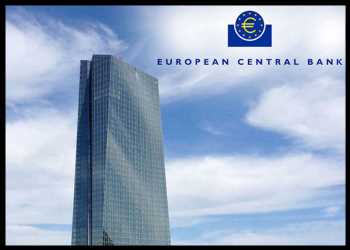ECB Minutes Signal June Review Of Economic Outlook, Stimulus

Policymakers are looking forward to review the Eurozone economic and inflation outlook, and the duration to continue stimulus in the monetary policy session in June, the minutes of the latest rate-setting session of the European Central Bank showed Friday.
Net asset purchases has hit the highest monthly purchase volume since July 2020, reflecting a marked increase versus average purchases in the first two months of this year, the ECB said. The sharp increase was despite the policy decision being taken mid-March.
“Members recalled that the monetary policy meeting in June would provide the next opportunity to conduct a thorough assessment of financing conditions and the inflation outlook,” the minutes of the April 21-22 meeting, which the ECB calls “the account” showed.
Policymakers would also be in possession of the latest set of ECB staff macroeconomic projections in June to help them form the assessment.
“Ample monetary policy support remained crucial beyond the pandemic period in order to support inflation and return it to the inflation aim,” the minutes said.
In the April meeting, the Governing Council reconfirmed its very accommodative monetary policy stance, leaving interest rates and the volume of asset purchases unchanged.
Expectations of a rebound in the euro area economy has prompted discussion on when the ECB will start withdrawing its massive EUR 1.85 trillion Pandemic Emergency Purchase Programme. The scheme is set to run till March next year.
ING economist Carsten Brzeski expects the ECB to try to exit from unconventional measures before the end of the year. Policymakers may not necessarily discuss possible tapering at the June meeting but at the latest, at the September meeting, the economist said.
ECB policymakers noted that the progress with vaccination campaigns and the envisaged gradual relaxation of containment measures underpin the expectation of a firm rebound in economic activity in the course of this year.
“An extension of the Pandemic Emergency Purchase Programme beyond March 2022 looks increasingly unlikely with the current vaccination and economic backdrop, unless the ECB wants to walk down the very controversial road of calling the pandemic over only when the economy has returned to its pre-crisis level,” Brzeski said.
“In any case, the ECB will want to avoid any abrupt end to net asset purchases and will therefore engage in its own twist: gradually ending asset purchases under the PEPP while increasing them under the old Asset Purchase Programme.”
The monthly purchases under asset purchase programme is currently EUR 20 billion.
While headline inflation picked up over recent months due to some idiosyncratic and temporary factors and an increase in energy price inflation, underlying price pressures remained subdued in the context of significant economic slack and still weak demand, the ECB said.
However, policymakers remained cautious about a strong euro. “It was underlined that a further appreciation of the exchange rate could have adverse implications for the inflation outlook,” the minutes said.
Source: Read Full Article
